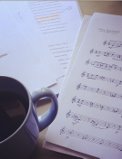Creating a Syllabus for Your Private Studio
Creating a Syllabus for Your Private Studio
Chances are, your band director, theory professor, music history teacher, or studio professor are very familiar with syllabi. Most institutions require educators to maintain up-to-date syllabi outlining their expectations, objectives, assignments, and overviews for their classes. For students, these are the papers you probably pretended to read and then threw away after they were distributed on the first day of classes (and frantically searched for during finals week to calculate your grade).
A syllabus is a valuable tool not only for educators, but also a great resource for students. Syllabi allow educators to organize their ideas for a class while simultaneously providing students with clear guidelines and expectations on their part. While syllabi are commonplace in institutions, there is a surprising absence among private instructors.
Every private instructor has dealt with last-minute “emergency” cancellations, students showing up without lesson materials, the “I forgot your check” parent, and the always-popular student who just won’t practice. Whereas these truancies can be reflected in grades at institutions, there is no clear outline of expectations for many private studios. Cue the syllabus – this is a chance for private teachers to provide information and structure to students and parents during private lesson instruction. Syllabi are effective means of communication, regardless of how many students are in your studio. Each private instructor should maintain a syllabus for their studio, where every question an existing or potential student or parent might have.
Each syllabus will be unique to each teacher, but here are some common components in syllabi:
Expectations: This is where you describe your expectations of your students. How often should they practice? What kind of attitude would you like them to exhibit during lessons? Will they complete a practice chart each week? Will there be any homework assignments between lessons?
Philosophy: What are your beliefs as a teacher? What fundamentals of the instrument do you focus on with your students? Will fundamental practice be supplemented with music theory or history? Why do you enjoy teaching music?
Contact Information: Provide your name and an e-mail address and phone number where you wish to be contacted. Specify if texting is an acceptable means of communication for you. If you prefer payment to be mailed to you, provide a mailing address.
Goals: Obviously, goals will be different depending on the student, but you should describe general goals for your entire studio. (Improve instrumental fundamentals, learn new repertoire, audition for All-State, etc.)
Materials: Again, materials will vary depending on the student. Include a list of required music, materials, and repertoire. Some common items include pencil, staff paper, notebook paper, tuner, metronome, and any assignments. A properly working instrument and good reed are at the top of my list – you would be surprised by how many students show up with an instrument that won’t play! You should also specify that students bring the original published music – photocopies of music are sometimes illegal and also hurt the music publishing business.
Attendance Policy: Describe your attendance policy in great detail so that there is no confusion when an absence occurs. How far in advance must you be notified of cancellations or rescheduling? Will a student be charged for a no-show? What is your policy on makeup lessons? Can you double up on lessons for a week? What is the protocol for tardiness?
Pricing and Payment: How much do you charge for a lesson? Do you offer 30, 45, and 60 minute lessons? Do you expect to be paid at each lesson, biweekly, or monthly? Will last-minute cancellations or no-shows be charged?
Resources: Include links to websites, blurbs about books, and anything else you believe will be useful to your studio. I have included several links to music theory websites, sight-reading exercises, musical vendors and companies, and recordings of top-notch performers. If you have a website, this is the place to include it.
About Me: A biography or highlights from your career allow students and parents to learn more about you. You might also include fun facts about yourself.
Feel free to pick and choose which components you would like in your syllabus (and also feel free to create your own!). Not only is this a chance for you to organize your thoughts and expectations for your students, but also for yourself. If you have a studio website, it is a great idea to include this online for parents and students to access anytime.
Good luck, and happy syllabus-writing!
